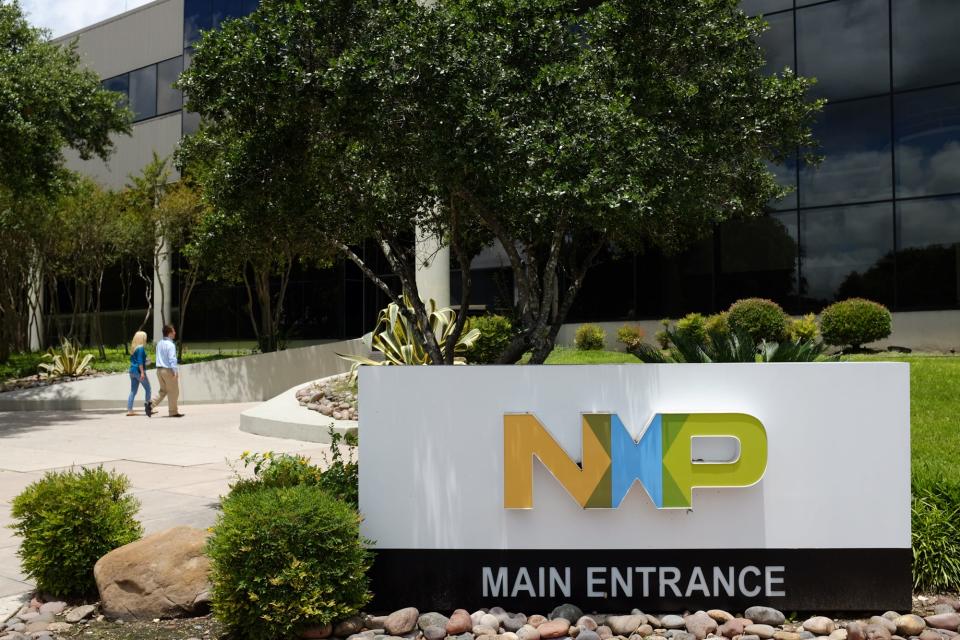NXP Semiconductor's proposed tax break deal with Austin district running out of time
A vote by the Austin school board on a proposed tax break for NXP Semiconductors appears to be running out of time as the proposal remains stuck in the Texas comptroller's office waiting for clearance from the state agency before the school board can accept or reject the deal.
The proposed Chapter 313 agreement — a state-created economic incentive program designed to lure companies to Texas — between NXP and the Austin district needs approval before the end of the year, when the tax break program expires. And with new school board members, some of whom have said they're against the deal, set to take their seats Dec. 1, the proposed agreement's chances for approval are slipping away.
The deal would give Netherlands-based NXP a break on school district taxes over 10 years for one or both of its proposed expansion sites in Austin. Under a Chapter 313 agreement, the district would cap the taxable value of the company’s improved property. The company would pay the district a fee, and the state would make up the district's lost tax revenue.

For the company, this would mean a tax savings.
For the district, it would mean millions in revenue not subject to the state’s recapture program, which collects money from property-rich districts, such as Austin, and redistributes it to districts with less property wealth per student. Recapture has been a point of consternation for the Austin district, which loses about half its property tax revenue — $846 million — to the program.
NXP, which last year made $11 billion in revenue, has two chip factories in Austin and is seeking $140.5 million in tax breaks for a larger project and $22.8 million for a smaller one.
As of Friday, the comptroller hadn't approved either of NXP's proposed Chapter 313 agreements with the district, a necessary preliminary step before district approval.
In the last legislative session, state lawmakers did not renew the Chapter 313 program, which will expire Dec. 31, and the comptroller's office is wading through a flood of applications from companies hoping to ge approval for their proposed projects before the year's end.
If the comptroller does approve NXP's proposal, the Austin district would still need to approve it, but new school board members seem largely leaning toward denying it.
Incoming District 1 Trustee Candace Hunter opposes the agreement because she fears taking school taxes away from the state might undermine district efforts to increase state funding per student.
"That’s money that doesn’t go back to the state," Hunter said. "That means there are districts out there that count on these funds who won’t be getting them. What’s the net impact on all of the children of Texas?"
Time has probably run out for the agreement, said incoming District 4 Trustee Kathryn Whitley Chu. She also worries that it could harm the district's credibility in advocating that the state send more dollars to local districts.
"I'm not convinced it's a big benefit for our long-term strategy for Texas," Whitley Chu said. "I don't think it's a long-term benefit for local kids and state kids."
David Kauffman, who ran unopposed for the open District 7 seat, echoed those concerns.
"I don’t want to scuttle reforming recapture because people think Austin is just being greedy and doesn’t want to fund public education across the state," Kauffman said.
Andrew Gonzales, the incoming District 6 trustee who unseated board President Geronimo Rodriguez, also worries about the district's ability to advocate for school finance reform if it accepts the NXP deal.
"It presents larger structural issues to school finance," Gonzales said.
Some returning board members, such as District 2 Trustee Ofelia Zapata, have expressed opposition to the agreement too.
NXP representatives didn't respond to requests for comment.
Under the company's potential Chapter 313 agreements, a $2.6 billion project would deliver $64 million to the district above what it's currently getting, and a $1.2 billion project would bring in an additional $12 million.
These estimates assume no change in the district's tax rate over the next 10 years.
The more expensive project would create 350 jobs, and the smaller one would create 150, both at a minimum salary of $68,500, according to the company.
The $2.6 billion investment involves constructing a 520,000-square-foot fabrication plant and a 47,000-square-foot central plant at 3501 and 2949 Ed Bluestein Blvd., alongside existing chip fabrication plants, according to the application. The project would enable production of advanced analog and logic devices for the auto industry.
The smaller project would expand the company's 6501 W. William Cannon Drive site, which would make way for production of advanced analog and logic devices for NXP's foundry business, the company said.
This article originally appeared on Austin American-Statesman: NXP's proposed Chapter 313 deal with Austin district slipping away

